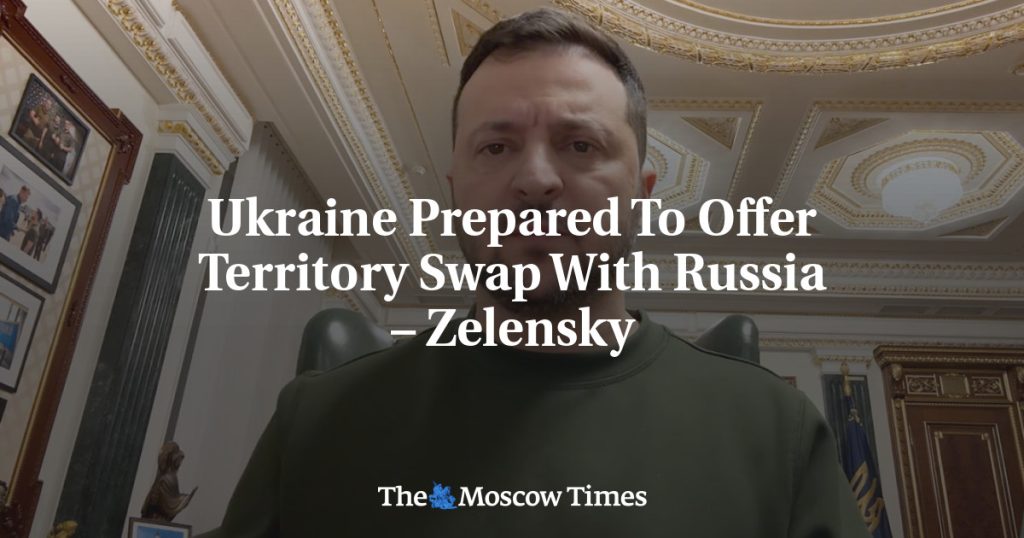Ukraine’s Path to Peace: Challenges and Opportunities in Negotiations with Russia
The ongoing conflict between Ukraine and Russia has reached a critical juncture, with Ukrainian President Volodymyr Zelensky revealing that Kyiv is prepared to offer a territorial swap as part of potential peace negotiations. In a recent interview with The Guardian, Zelensky emphasized the importance of U.S. involvement in any future security guarantees, stating that Europe alone cannot bear the responsibility of ensuring Ukraine’s safety. This statement underscores the deepening reliance of Ukraine on American support, even as voices within the U.S. question the extent of its involvement. The upcoming meeting between Zelensky and U.S. Vice President JD Vance at the Munich Security Conference highlights the urgency of finding a resolution to the nearly three-year war, which has devastated vast swathes of Ukraine and displaced millions.
Zelensky’s willingness to engage in territorial negotiations signals a pragmatic approach to ending the conflict, though the terms of such a deal remain uncertain. He mentioned that Ukraine could offer to swap territories it has recently reclaimed in Russia’s Kursk region for other areas under Russian control. However, the Ukrainian leader admitted that the specifics of such a swap, including which territories would be exchanged, remain unclear. This ambiguity reflects the complexity of the issue, as both sides are likely to have competing interests and priorities in any potential territorial agreement. Meanwhile, Russia continues to assert its claim over five regions of Ukraine, including Crimea, which it annexed in 2014, and four others seized in 2022. Despite these claims, Russia does not fully control all the territories it has annexed, leaving the situation on the ground highly fluid and volatile.
The role of the United States in Ukraine’s future security cannot be overstated, according to Zelensky. He dismissed suggestions that Europe could provide sufficient security guarantees without American involvement, calling such assurances "not real." This stance reflects Ukraine’s skepticism about the ability of European nations to provide the necessary military and economic support to deter future Russian aggression. Instead, Zelensky is seeking robust security guarantees from Washington, including potential NATO membership or the deployment of peacekeeping forces. These demands are motivated by fears that any settlement lacking concrete military commitments could allow Russia to regroup and launch a fresh attack in the future. The stakes are high, and Ukraine is betting on the United States to play a pivotal role in safeguarding its future.
As the international community pushes for an end to the war, U.S. President Donald Trump has emerged as a key figure in efforts to broker a peace deal. Trump recently confirmed that he would soon send his special envoy, Keith Kellogg, to Ukraine to develop a proposal aimed at halting the fighting. While Trump is eager to secure a swift resolution to the conflict, Zelensky is taking a cautious approach, insisting on strong security guarantees as part of any agreement. This divergence in priorities highlights the challenges of aligning the interests of all parties involved, with Ukraine seeking long-term stability and the U.S. aiming for a rapid conclusion to the war. The outcome of these negotiations could have far-reaching implications for the region and the global balance of power.
In a bid to win American support, Zelensky has dangled the prospect of lucrative reconstruction contracts for U.S. companies. Ukraine, endowed with some of Europe’s largest mineral reserves, is eager to attract American investment in its post-war reconstruction efforts. Zelensky has framed this as a win-win proposition, with Ukrainian businesses benefiting from the creation of jobs and American firms reaping profits. He also emphasized the strategic importance of preventing these valuable resources from falling into Russian hands, arguing that it is in the interests of the United States to ensure Ukraine’s economic and political stability. By leveraging economic incentives, Zelensky hopes to strengthen U.S. commitment to Ukraine’s recovery and security, even as voices within the U.S. question the extent of its involvement.
The Munich Security Conference takes place against the backdrop of continued Russian advances in Ukraine’s eastern Donetsk region. Over the past year, Russian forces have captured several settlements, many of which have been reduced to rubble by relentless bombardments. This grinding conflict has exacted a heavy toll on both sides, with no clear end in sight. As Zelensky prepares to meet with Vance and other global leaders, the stakes could not be higher. The coming weeks and months will determine whether Ukraine can secure the guarantees it needs to ensure its sovereignty and security, or whether the war will drag on, inflicting further suffering on its people. The world watches with bated breath as Ukraine navigates this perilous path, seeking a peace that is both lasting and just.












